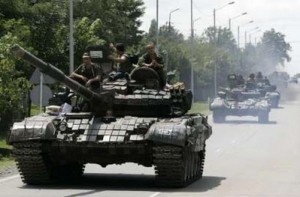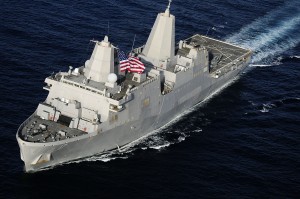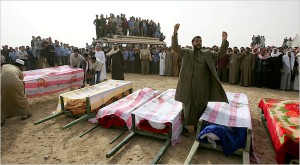Obama Admin Again Leads With Behind: Super Secret Syria Plan
BY Glen TschirgiFrom Josh Rogin at Foreign Policy, “Obama Administration Secretly Preparing Options For Aiding the Syrian Opposition.”
As the violence in Syria spirals out of control, top officials in President Barack Obama‘s administration are quietly preparing options for how to assist the Syrian opposition, including gaming out the unlikely option of setting up a no-fly zone in Syria and preparing for another major diplomatic initiative.
This is one of those articles that illustrates the quandary of politics and democracy in America, circa 2012. A Leftist can read the article and feel concerned but encouraged that the Obama Administration is carefully reviewing options and nicely weighing consequences and unforeseen possibilities. A Conservative can read this very same article and find a mother lode of examples of everything that is wrong with Obama and his foreign policy team. So without offense to Mr. Rogin, we will begin to mine.
In the lede paragraph we find that the Administration is, “quietly preparing options for how to assist the Syrian opposition, including gaming out the unlikely option of setting up a no-fly zone in Syria and preparing for another major diplomatic initiative.” The fact that this is even news is disturbing. Isn’t this one of the principal tasks of any administration– to look at the likely hot spots on the globe and have a plan, even (gasp) a strategy for each? The reaction of the Obama Administration to Syria is the same as it was for Libya as it was for Iran as it was for Egypt as it was for Iraq: caught with its pants down.
There is no stratagey, no over-arching view of the world that weaves U.S. foreign policy into a coherent set of goals and takes pro-active action, in advance, of events. In short, the Obama Administration has been playing defense from day one. And it shows. When the people of Iran rose up and marched in the streets to denounce the fraud and, later, to demand an end to the Regime, Obama’s reaction was to stay out of it. There was no thought of seizing an unparalleled opportunity to change the trajectory of the Middle East overnight. In Libya, the Administration went along for the ride with Britain and France, or, more precisely, Britain and France took the U.S. for the ride, relying on U.S. logistics and air power for the bulk of the mission. And, despite the War Powers Act, Obama never once articulated a rationale to support the use of force (and the risk of American lives) in Libya. Obama waffled back and forth on Egypt, with different Administration officials making conflicting statements for months before Mubarak was thrown to the wolves. Even now, with the Muslim Brotherhood on the verge of gaining power in Egypt, the Administration is busy reacting—or perhaps better known as covering its rear end by painting the Brotherhood as a “moderate” Islamist group.
Notice, too, in just this, first paragraph, how the Administration is busy “preparing for another major diplomatic initiative.” That pretty well sums up Obama’s first term in world affairs: floating one “major diplomatic initiative” after another, even in the face of abject failure and embarrassing rejections. Iran is busy developing nukes? No problem. Let’s get our terrific allies, the Russians and Chinese, to get behind Security Council resolutions that have no, real teeth and do nothing to stop the nuke program. Here we go again with Syria. An opportunity to take out one of the worst enablers of terrorism, a puppet of the Iranian Regime and an implacable foe of our only ally in the Middle East, Israel, and Obama is busy “preparing for another major diplomatic initiative.” Oh and “the unlikely option” of a no-fly zone.
Every line of Rogin’s piece is like a manual on what is wrong with this Administration:
…U.S. officials said that they are moving cautiously in order to avoid destabilizing Syria further, and to make sure they know as much as possible about the country’s complex dynamics before getting more involved. [Emphasis added]
Yes, this thing in Syria is just so, darn complex that we have to move slowly because, you know, we wouldn’t want Syria to become even less stable than it is now, what with the tanks in the streets and snipers randomly shooting civilians trying to buy bread. And, of course, that Bashar Assad is such a “reformer” that we want to make sure he stays in power as long as possible.
And here’s a great line about the Administration’s idea of taking action:
…the administration is now ramping up its policymaking machinery on the issue. After several weeks of having no top-level administration meetings to discuss the Syria crisis, the National Security Council (NSC) has begun an informal, quiet interagency process to create and collect options for aiding the Syrian opposition, two administration officials confirmed to The Cable. [Emphasis added]
I have to hand it to Rogin on that sentence: it is a marvelous description of an Administration steeped in timidity laced with inaction bounded by circumspection and ringed with preliminary precaution. “[S]everal weeks” of no, real discussions about Syria!? What were the “top-level” people doing in the months before that when Syrians were demonstrating against Assad and being killed? I know, I know, it’s a busy world and there’s a lot of golf that needs playing.
But not worry. We are told that the NSC is on top of it now. Uh… with “informal” and, um, “quiet” talks to “create and collect options” to do something. This has to be the biggest exercise in foot dragging ever. Essentially the Administration does not want to do anything with respect to Syria except, perhaps, give the impression that it is really, really about to get serious about thinking about creating an “interagency” panel of some sort who will exchange memos about how to study the issue of, perhaps, aiding the Syrian opposition.
The unmistakable impression is that the Administration is not just playing defense here, they are doing everything they can to run out the clock in the hopes that someone else will do something (and if that “something” happens to turn out well, then take full credit for that result and trumpet it as another foreign policy triumph).
Well, at least there seem to be some options on the table:
The options that are under consideration include establishing a humanitarian corridor or safe zone for civilians in Syria along the Turkish border, extending humanitarian aid to the Syrian rebels, providing medical aid to Syrian clinics, engaging more with the external and internal opposition, forming an international contact group, or appointing a special coordinator for working with the Syrian opposition (as was done in Libya), according to the two officials, both of whom are familiar with the discussions but not in attendance at the meetings.
“The interagency is now looking at options for Syria, but it’s still at the preliminary stage,” one official said. “There are many people in the administration that realize the status quo is unsustainable and there is an internal recognition that existing financial sanctions are not going to bring down the Syrian regime in the near future.”
Gosh, it’s great that the U.S. is so focused on providing “humanitarian” help to these people that are being shelled by Assad’s artillery. They probably do need alot of bandages and stuff. But somehow it seems strange that Obama was hell-bent to bomb the pants off of Qaddafi for, what was it? Oh yes, the possibility of a “humanitarian disaster,” but when it comes to Syria, where people are actually dying at the hands of a ruthless dictator in a country that actually has vital importance to the U.S., Obama is playing the coy, young girl. Yes, when important world events demand immediate action you can count on sweet Miss Barack to spend months writing in his diary and having endless slumber parties before coming to anything like a decision. This does not earn the U.S. any points in the world, though perhaps it will do something for Barack Obama at this year’s Miss World competition.
But, as it turns out, Mr. Rogin found at least “one official” who was willing to (anonymously) provide an explanation of the Administration’s odd behavior:
“Due to the incredible and far-reaching ramifications of the Syrian problem set, people are being very cautious,” the official said. “The criticism could be we’re not doing enough to change the status quo because we’re leading from behind. But the reason we are being so cautious is because when you look at the possible ramifications, it’s mindboggling.”
A power vacuum in the country, loose weapons of mass destruction, a refugee crisis, and unrest across the region are just a few of the problems that could attend the collapse of the Assad regime, the official said.
“This isn’t Libya. What happens in Libya stays in Libya, but that is not going to happen in Syria. The stakes are higher,” the official said. “Right now, we see the risks of moving too fast as higher than the risks of moving too slow.”
I don’t know, maybe I just have impossibly high standards for civil servants, but, unless this “official” with knowledge of these discussions is the office janitor who happens to be in the room changing EPA-approved CFC lightbulbs, it sounds a bit funny: the Administration is being hyper-cautious because of the “incredible” and “far-reaching ramifications” of taking any action in Syria. Ooooh. There are “ramifications.” And they could be “incredible.” And “far-reaching.” [Director’s Note: Insert here shot of President in fetal position in dark corner, sucking thumb, blankie in other hand]. As the “official” said (with no trace of irony as far as I could tell), “It’s mindboggling.”
And the examples? A “power vacuum” in Syria? Got news for you, buddy, Syria under the Butchers of Damascus (Assad I and Assad II) has been plenty frightening. When the Assads have not been killing and torturing their own people, they have been busy assassinating every pro-Western leader in Lebanon, assisting Iran’s plans to obliterate Israel, hosting and training terrorists for worldwide terror missions and trying to develop their own nukes (until Israel blasted the nuclear reactor to oblivion in 2007). How much worse are we talking here?
“Loose weapons of mass destruction” ? Come on, now. We’re not falling for that one again. The Left screamed their little heads off that Saddam did not have WMD’s and all the evidence that they were moved to Syria in the year prior to the 2003 invasion of Iraq have been ridiculed by the Left. Surely Obama is not going to try to tell us that Syria has WMD’s, is he? That just opens up too many cans of worms, even for a guy who owns the Leftist Media in this country.
And a “refugee crisis, and unrest across the region” ? The entire Middle East is a refugee crisis and non-stop unrest. Nothing the U.S. could do in Syria is going to change these eternal features. This is truly one of those situations where things have to get better because they cannot get any worse.
I could go on and on. Literally. This valuable piece by Josh Rogin is comedy gold and you should read the entire thing. Yes, those chortles will be mixed with tears of frustration at such an inept Administration, but these days we have to find the silver lining anywhere we can.
Here are just a few more highlights:
“This isn’t Libya. What happens in Libya stays in Libya, but that is not going to happen in Syria. The stakes are higher,” the official said. “Right now, we see the risks of moving too fast as higher than the risks of moving too slow.” [Really? Syria is more important than Libya? Now there’s a good reason to go even slower! And you have to love the tie-in with Las Vegas.]
***
The option of establishing a humanitarian corridor is seen as extremely unlikely because it would require establishing a no-fly zone over parts of Syria, which would likely involve large-scale attacks on the Syrian air defense and military command-and-control systems. [Yes, attacks against the air defenses and command-and-control should only be attempted against third-rate loons like Qaddafi where our vital interests are at stake.]
***
Rhetorically, the administration has been active in calling for Syrian President Bashar al-Assad to step aside and protecting the rights of Syrian protesters, despite the lack of clear policy to achieve that result. “The United States continues to believe that the only way to bring about the change that the Syrian people deserve is for Bashar al-Assad to leave power,” White House spokesman Jay Carney said on Dec. 21. [I am told that Jay Carney scored rather well on the Journalism 101 test for stating the obvious. Still, it’s good that Obama sees the problem even if he has no clue what to do about it.]
As the comedy writers are fond of saying about real life, “You just can’t make this stuff up.” But it took Obama to bring us the perfect marriage of U.S. Foreign Policy and Comedy Central. And with CNN World, you can get this farce 24 hours a day, 7 days a week. Expect things to get much funnier in 2012.






